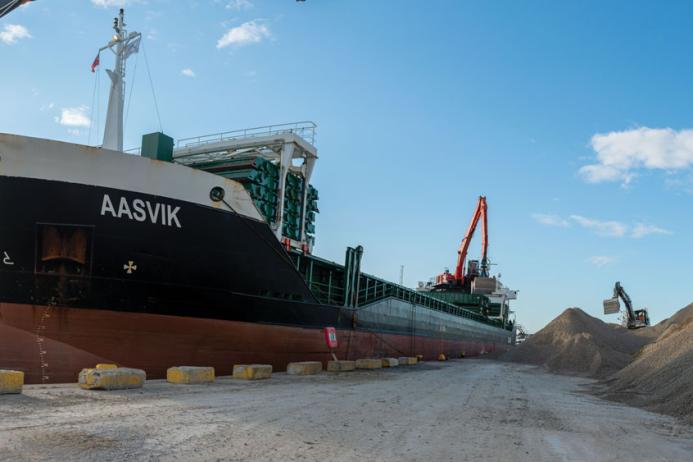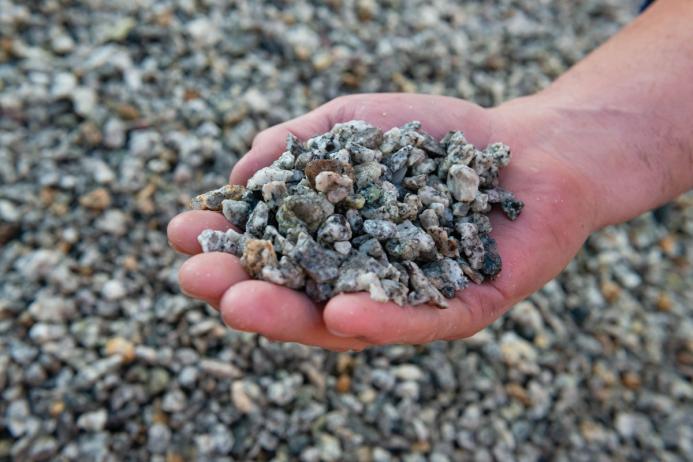Low-carbon secondary aggregates shipped into London by sea

First published in the June 2023 issue of Quarry Management
GRS shipping low-carbon secondary aggregates from Cornwall to the capital
Last year saw the first sea shipment of construction aggregates derived from Cornish china clay waste brought into London by UK recycled materials specialists GRS. The delivery marked the start of an exclusive deal which allows GRS to import more than 500,000 tonnes of secondary granite – branded Enviroc – from Cornwall into the capital each year by ship, with a fraction of the embodied carbon of other construction aggregates.
The GRS material, which is available in bulk or bags, is suitable for almost every construction application, from sub-base and capping layers to structural concrete and asphalt, and even decorative landscaping.
Recognized by leading green building rating systems as one of the most sustainable alternatives to newly quarried aggregates, Cornish granite has previously been used in a handful of London developments, including the Olympic Park, but its widespread use has been constrained by the belief that transporting it into London is not viable.
However, in partnership with the Port of Tilbury, GRS have invested £4 million in a new aggregates processing plant on the dockside to produce a range of high-quality, certified single-sized products to meet the needs of construction across London. Because of the plant’s location, that material can be delivered across the capital by road, rail, and even river, using GRS’s wholly owned Thames freight business, Walsh Marine.
For centuries, the production of china clay (kaolin) has shaped the Cornish countryside. For every tonne of china clay extracted, around 9 tonnes of granite by-product are generated, and this has built up into enormous waste piles, estimated to be around 500 million tonnes, which are now the source for Enviroc aggregates. The new venture sees GRS’s Cornish subsidiary, Maen Karne, haul the raw material from a china clay pit near St Austell to nearby Fowey harbour where it is loaded on to ships to make the 400 nautical mile trip to Tilbury for processing.

Antony Beamish, managing director of GRS Trading, said: ‘This major investment allows us to turn an industrial by-product into a high-quality construction aggregate, Enviroc. By also transporting this material by water we can achieve unparalleled environmental performance – an independent study suggests the carbon footprint is, on average, 47% lower than the equivalent primary aggregates. That makes Enviroc arguably the UK’s most sustainable aggregate. Using it in combination with low-carbon cement, for example, could produce the lowest-carbon concrete achievable.
‘We anticipate that Enviroc will change the way materials are specified on major construction jobs. Contractors can count on a consistent quality product that meets specification and, at the same time, know that it’s the most sustainable aggregate there is – a UK-sourced industrial by-product transported by water. It doesn’t get better than that.’
Aggregates make up the single biggest volume of material needed for virtually every construction scheme, and London consumes about 10 million tonnes each year. With recycling of demolition and excavation waste virtually at its maximum in the capital, GRS believe the way to further improve the sustainability of aggregates is to use secondaries and transport them as efficiently as possible. In 2021, GRS announced an exclusive deal to bring to market millions of tonnes of granite aggregate arising from a tungsten mine which has reopened near Plymouth, in Devon.
As well as the marine wharf and processing plant at Tilbury, GRS will use a recommissioned rail freight terminal to transport secondary aggregates more widely across Greater London and the South East. Transporting aggregates by river and rail will significantly reduce road miles and traffic congestion and represents a fraction of the carbon emissions of road haulage.
Subscribe to Quarry Management, the monthly journal for the mineral products industry, to read articles before they appear on Agg-Net.com








